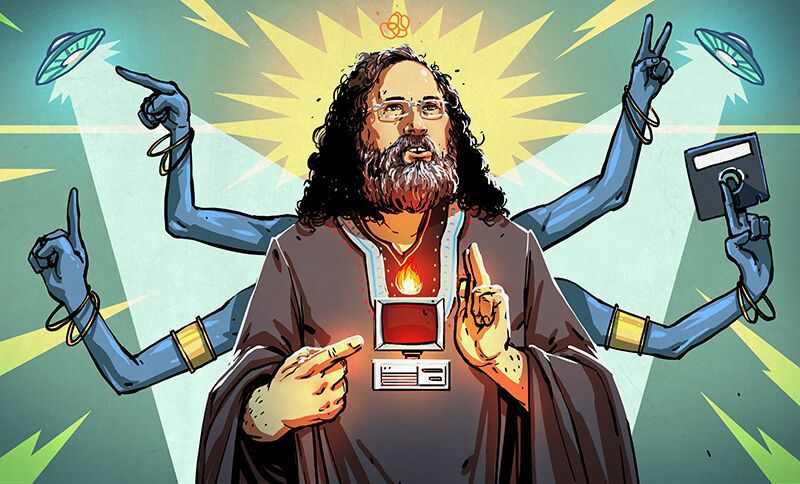The term “free software” is sometimes misunderstood — it has nothing to do with price. It is about freedom.
–Richard Stallman
A 21st century depiction of Stallman, American deity of technology and freedom. Image source: Hackaday
Open source culture is fundamentally about freedom. It’s a counterargument to the concept of copyright. Unlike proprietary software, which is based on the idea that programs belong to the person who wrote them, open source programs are free software that anyone can use or modify.
As described by GNU founder Richard Stallman in the book Open Sources: Voices from the Open Source Revolution1:
A program is free software, for you, a particular user, if:
- You have the freedom to run the program, for any purpose.
- You have the freedom to modify the program to suit your needs. (To make this freedom effective in practice, you must have access to the source code, since making changes in a program without having the source code is exceedingly difficult.)
- You have the freedom to redistribute copies, either gratis or for a fee.
- You have the freedom to distribute modified versions of the program, so that the community can benefit from your improvements.
Open source culture has its roots in hacker culture — the freewheeling spirit of early computing development.2 Programmers like Stallman freely shared their knowledge to solve problems and build infrastructure. It wasn’t until companies like Microsoft and AT&T asserted control over their products that the concept of copyright was applied to software. Today, copyrighted software is the norm in the computing world.
Proponents of open source believe that copyright law gives corporations too much power at the expense of software users. They see it as a form of exploitative economic monopoly. In contrast, open source culture places the means of production in the hands of software users. It doesn’t allow anyone to enforce unfair restrictions on anyone else.
The ideals of open source have spread beyond software. Creative Commons licenses3 are alternative copyright licenses that give more freedom to users than traditional copyright. When art, music, writing, or other creative works are licensed under Creative Commons, other people have the right to freely share or remix those works, resulting in a more vibrant creative landscape.
But open source culture is not without its drawbacks. Copyright law exists because it helps creators receive payment and recognition for their work.4 Because we pay for copyrighted material, that funding rewards creators and gives them an incentive to improve their products. We can’t give up copyright without giving up these benefits for creators as well.
In conclusion, open source culture offers an alternative to traditional copyright. It levels the playing field by making software and creative work the property of everyone — not just individuals and corporations. As creators and consumers, we can learn from the different approach that open source culture takes, and perhaps apply something of what we’ve learned to our own lives.
Footnotes
1. Stallman, R. (1999). The GNU operating system and the free software movement. Open Sources: Voices from the Open Source Revolution. Retrieved from http://www.oreilly.com/openbook/opensources/book/stallman.html
2. Vaidhyanathan, S. (2005). Open source as culture/culture as open source. The Social Media Reader. New York, NY: New York University Press. Retrieved from https://oss.adm.ntu.edu.sg/17s2-dn1010-tut-g05/wp-content/uploads/sites/2251/2018/01/OpenSourceCulture_reduced.pdf
3. Frequently asked questions. (2017). Retrieved from https://creativecommons.org/faq/
4. Why copyright matters. (2017). Retrieved from https://www.mlaw.gov.sg/content/minlaw/en/CopyrightReview/copyright-matters.html
